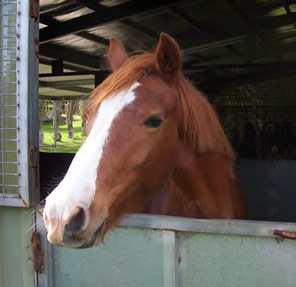Over the stable door
Greetings Fellow Equines and Horse Owners!
Before the beginning of last summer I would have discussed with you the importance of keeping your equines safe in times of disasters, namely bushfires.
As a reminder, I will run through those basics again:
Make sure you have decided whether to stay or go and how you are going to implement that.
If you have only one horse and a float, then the decision is where to take it if you are leaving. If you have two or more, then the order in which you take them may be important.
Have a record to hand at home and in your tow vehicle of the horse(s) details, such as brands, colour, sex, markings, scars, age and temperament.
In your tow vehicle keep a horse first aid kit and spare halter(s) and ropes, vet phone no (more than one if possible). This is a good idea as routine anyway.
Extra feed, including containers (nets/tubs) if possible and spare water supplies can also be stored in the float.
On high risk days do not rug or leave any gear on the horse. Also keep tails well-trimmed as they are quite flammable.
Keep yourself well informed via radio as to the weather status so that you will be well prepared to evacuate.
Also keep in touch with neighbours, as they may be better informed than yourself!
Now there are some other factors to take into consideration which will help in the evacuation/handling or relocation of your horse.
How easy is your horse to handle? It will help if he/she can be safely handled by anyone. If not, then there may be some homework to do there, or at least keep a record of any special considerations (flightiness etc). If any veterinary treatment is required, it will be easier if your horse is well trained. Basically this means that he can tie up, stand still and float obediently. Even if your horse is retired from riding, it may be helpful to revise those floating skills every now and then. Revising in a panic situation is probably not going to be completely successful! The same applies to exposing your steed to new stimuli and situations. This could be as simple as loud noises, different vehicles, tying up in a different location and so on. Even feeding in a different place can be useful. Some changes may need to be gradual, but it would make relocation less stressful for your horse if you do your homework. Keeping your horse socialised is also useful, again in reducing possible stress in a new situation. And finally, remember the KISS principle – keep both rugging and feeding routines as simple as possible. In relocating, it may be someone different either rugging or feeding your horse, so the simpler this is, the better it is going to be for your horse.
In the end, it is in the planning ahead that will possibly save you and your horse from a potentially stressful situation and will aid in recovery if that is a factor.
Without trying to put the wind up everyone, there is always help at hand – your local CFS can give excellent advice as can HorseSA.
So happy homework everyone and hopefully a safe summer!
Hamish

